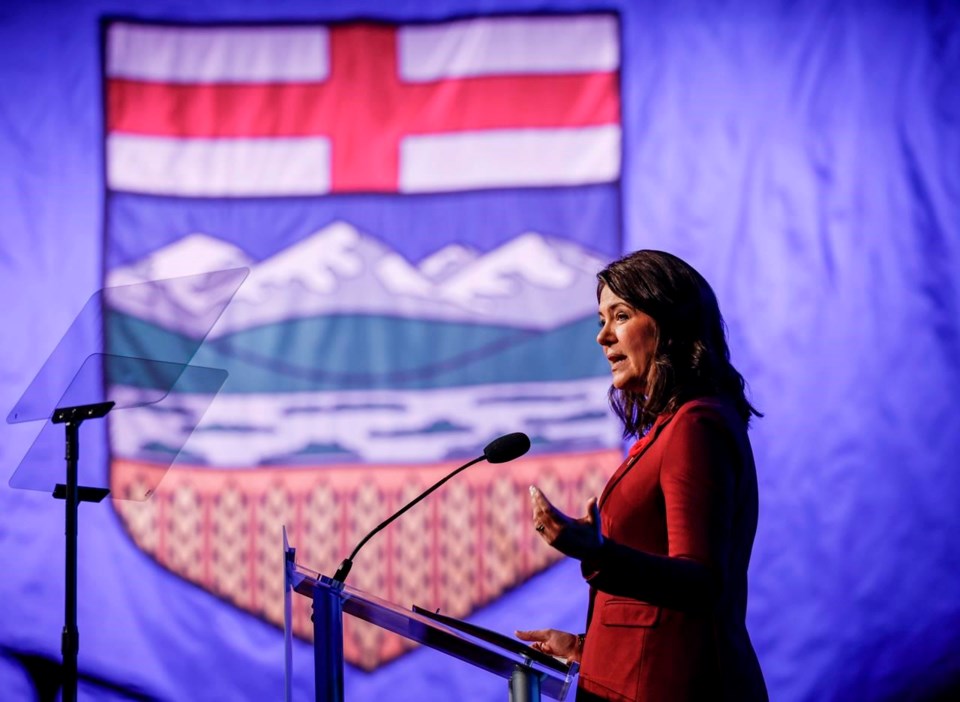Alberta Premier Danielle Smith is warning that softening oil prices means provincial funding won't keep pace with population growth in next week's budget.
In a televised provincewide address on Wednesday night, Smith said the Feb. 29 provincial budget will be balanced but fiscal belt-tightening is required.
"Spending cuts will not be needed," Smith said in the eight-minute address, aired on TV and online.
"Lower resource revenues will certainly require us to show more restraint than previously predicted.
"We will ensure this is done thoughtfully and with priority given to the programs and services Albertans most rely on such as health, education and social supports."
Smith said she has instructed Finance Minister Nate Horner to limit government spending to below the legislated rate cap of inflation plus population growth.
The Opposition NDP has long accused the province of failing to fund for growth in health care and education and has said not matching funds to growth is equal to a budget cut.
Census data provided by the province last November reported Alberta added 184,000 people for 4.1 per cent growth in the 2023 census year. Growth of 2.9 per cent is expected in the 2024 census year.
Earlier this week, NDP finance critics Shannon Phillips and Samir Kayande said they expect the budget will fail to pony up the money needed to fix crumbling health-care and education systems.
"To maintain business as usual, we would need to see a five per cent increase in the budget," Phillips said Tuesday.
"We need improvement, and the only thing the UCP are delivering is broken promises."
For decades, Alberta has tied budget spending to the mercurial ups and downs of oil and gas prices, leading to years of eye-popping multibillion-dollar surpluses set against equally alarming deficits.
Alberta's most recent forecast for this budget year, which ends in March, forecasts a $5.5-billion surplus against almost $69 billion in spending. It is tied to West Texas Intermediate — the North American benchmark price for oil — averaging US$79 a barrel.
On Wednesday, the West Texas price was trading at around US$78 a barrel, and every $1-a-barrel change in that price over thecourse of the year alters Alberta's revenues by $600 million.
In this budget year, oilsands royalties alone are expected to deliver more than $14 billion in revenue.
The province's mid-year fiscal update unveiled in November predicted the West Texas price to average US$76 a barrel in the upcoming budget year and US$73.50 the year after that.
Smith, in her speech, said it's time for Alberta to get off the "budget roller-coaster" that relies on natural resource wealth.
She rejected a sales tax or hiking taxes to solve the problem.
"We only need look at some of our fellow provinces and many U.S. states, to know that increasing these kinds of taxes to balance a budget is a recipe for economic decline," she said.
“That will not be the approach of our government."
Smith reiterated she won't immediately follow through on her 2023 election campaign promise to make changes to tax rules to deliver about $760 more a year for those making over $60,000 — a change that would cost the province about $1 billion.
"Personal income tax cuts will have to wait a year and be phased in responsibly," she said.
Smith said her government will continue to invest in the nest egg Heritage Savings Trust Fund, set to reach $25 billion this fiscal year, and draw up a long-term plan to use the fund to wean the province off resource revenues.
"Before the end of this year, our government will publicly release a long-term financial plan charting a path to a Heritage Fund of between $250 and $400 billion by the year 2050," she said.
That year, she added, is also the target for achieving a carbon-neutral economy.
The report by The Canadian Press was first published on Feb. 21, 2024.
Colette Derworiz, The Canadian Press




